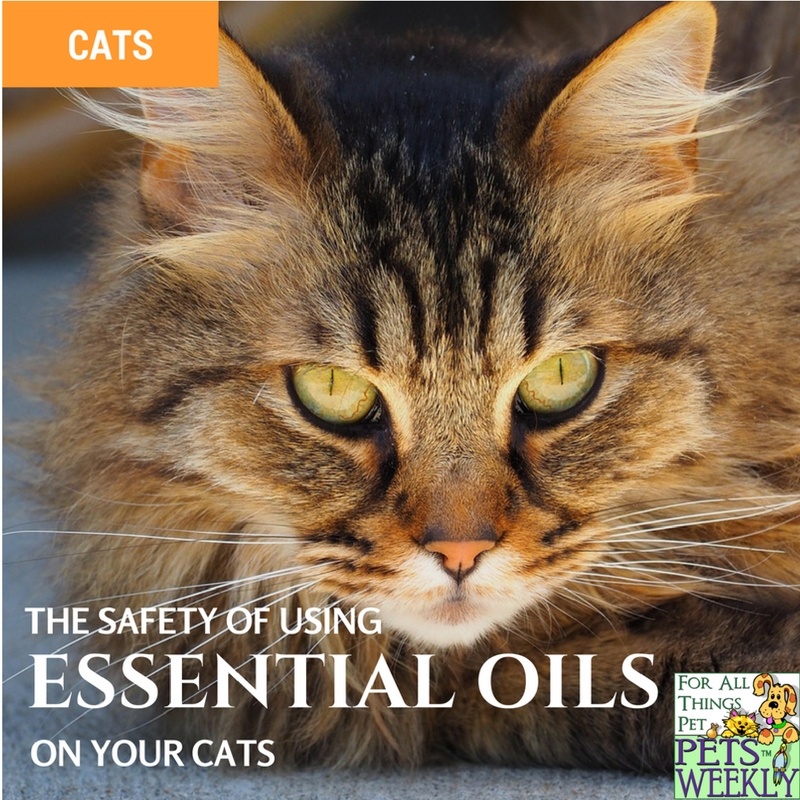Using Essential Oils on Cats
Share

We all know how effective natural remedies can be for humans, but when used properly essential oils and other natural remedies can make a big difference in the lives of your cats. But, it’s very important to understand that using essential oils and natural remedies on cats requires a very different approach. If you don’t know what you’re doing, you can seriously burn, injure or cause long-term damage to your feline.
Cats have a very different physiology from humans and dogs. First off, they lack a critical enzyme that is used to metabolize certain compounds. This makes it difficult to process
Why Are Cats So Sensitive to Essential Oils?
Cats are particularly sensitive to specific compounds in essential oils as they have very thin and delicate skin, which makes them highly sensitive to topical applications. Also, their thin skin allows for a quicker absorption rate and faster response times, making them highly sensitive to essential oils. Cats also have additional challenges in that they can’t metabolize certain compounds, which can quickly lead to a toxic buildup in their bodies, causing irreversible liver damage.
They also have an incredibly acute sense of smell – so you must use highly dilute products. Each animal will differ in what they respond to (both negatively and positively), which makes it even more difficult to use essential oils in multi-cat households.
Before using essential oils in your cat’s water supply, be certain you understand the risks in doing so. Most cats avoid drinking enough water on their best days, so it can be a challenge to place any type of oil into their water without increasing the chance they will have kidney problems.
You may think I’m going to argue that you should never use any type of essential oil in or around a favored feline, but I’m not – because the same qualities that makes cats so sensitive to natural treatment also makes them great candidates for natural treatment.
Beware Placing Natural Remedies in Water
We love to use flower hydrosols rather than essential oils, but it’s important not to place anything in your cats primary drinking supply.
Cats have a highly tuned sense of smell that rivals even dogs. They can detect even the tiniest change in their drinking supply. This could easily put them off water completely, and if another clean source is not provided, they could become dangerously dehydrated. In a multi-cat household, be certain you take the proper precautions before using any kind of natural remedies in the water.
Before using essential oils (or other natural remedies) in any species, you must understand the precautions that must be exercised to not only to have a favorable reaction, but to avoid dangerous reactions (you’ll also want to make sure you Understand Toxicity Levels of Natural Cures)
Natural products for cats
These are a few of the all-natural and “almost” synthetic, but natural enough products that I feel very confident recommending to you:
Bach Cat Rescue Remedy
Bach Pet Rescue Remedy was created by Dr Bach to deal with emergencies and crises. This formula uses flower remedies and hydrosols rather than essential oils. This is product that needs to build up in your cat’s system for a few days before you notice a difference. We have found it to be a wonderful way of calming our pets during transportation, in an emergency, during stressful visits, or to restore peace in multi-pet households.
ComfortZone with Feliway
Comfort Zone Multi Cat Calming Diffuser products are derived from pheromones and clinically proven to be 95% effective to reduce urine marking and vertical scratching. This product is a standard fixture in our home as we rely on it’s calming influence to manage our multi-pet household.
Azmira
We’ve found many of their products to be highly effective in both dogs and cats, and particularly like the Spraying Flower Essence for Pets. Again, pay attention to the dosing. These remedies help the mind overcome bad experiences, fears, and stressful feelings that interfere with proper function, diminishing the pet’s ability to think and learn.
DERmagic
This line of all natural skin care products for pets is one of our all-time favorites. It’s designed to naturally resolve problems related to yeast (skin irritations, flea allergies, dermatitis, and dandruff), yet gentle enough to be used on our cats. One of our favorites is the Diatomaceous Earth Dust., which is truly an effective way to fight off fleas around the house.
Your Guide to Buying Essential Oils
NEVER buy essential oils, hydrosols or any other natural product from large stores like Walmart or Walgreens. This is very important. When choosing a natural product for you or your pets, splurge for a proven, reputable company that can provide individual testing results for each batch.
There are several essential oil companies you can check out. While some are multi-level investments, others are buy as you go (our preference). Remember that essential oils are only as good as the plant. Make sure you understand the following:
- Was the plant grown organically? For example, hemp is a bio cleaner of soil. It will draw the toxic heavy metals out of the soil. This process is called phtyoremediation. While it is incredibly beneficial for cleansing heavy metals from our ground, it does have the ability to contaminate the plant.
- What type of chemicals or heavy metals may have been used in the ground before planting? This is especially important when using natural remedies. The vendor or distributor should know what types of crops may be contaminated.
- Where was the plant grown? This is important in specific plants like chamomile, frankinsence, lavender and more. Understand where crops are most successful and where they thrive. It’s not always the USA.
- Were there chemicals used in distillation or extraction? Coffee drinkers know that many chemicals are used to process and/or decaffeinate coffee. Undestand what type of distilation or other process was used to manufacture plants.
- What are their extraction processes? This can vary dramatically across manufacturers.
- Are testing results available for each batch? Most reputable and all organic manufacturers can provide their Gas Chromatography Mass Spectrometry (GS/MS) reports from each batch. Learn how to find these results and how to read them.
One way to do easily this is to only buy from reputable companies. The companies below are ones that we trust. we personally use are ones that use most often on ourselves. You may prefer oils from an MLM like Doterra or Young Living or one of the many great manufacturers out there.
Remember that you get what you pay for – a higher price is generally indicative (but not always) of a safer, high-quality oil.
Essential oils should NEVER be applied “neat” (without dilution) to any animal. Also, they should never be diffused or used around birds or reptiles. Use extreme caution when applying essential oils to your pets – reactions may not manifest immediately and you could send your cat into organ failure within a few weeks without knowing it.
Here are two oils we feel are generally safe recommending if used at dilute levels (1 drop EO to 5 ml carrier oil – we like organic, fractionated coconut oil):
Lavender
Lavender essential oil (or better yet, lavender hydrosol) can be quite useful in reducing stress in cats. However, the oil must be a pure grade and it must be highly dilute. Common dilution calls for 1-10% of what the human uses.
For example, you should place 1 drop essential oil in a dram and add 5-25 ml of Fractionated Coconut Oil or other light carrier oil.
Roman Chamomile
This is another favorite for our home and the animals respond quite well to it. We often diffuse Roman Chamomile and Lavender in our home and it is a wonderful way to calm anxious pets.
We will be adding more oils and an oil guide as we progress through our own learning curve and identify solutions that work.
Your Cat Knows Best!
Never force your cats to wear, consume or inhale natural oils. Trust that they know what their limits are and if they ever demonstrate a reaction (behavioral – such as spraying or peeing on bed, or physical – tremors, shaking), see your veterinarian immediately.
These are emergency situations:
- Behavioral issues: Unusual aggression, hiding, “yowling” or other unusual vocalization
- Physical issues: Physical tremors, head shaking, scratching, breathing disorders, spraying
Common Sense Guidelines for Using Remedies On or Around Cats
- Use highly dilute forms: Your cats are hyper-sensitive to nearly everything and moderation is always best. If you can’t smell an oil, that’s okay – your cat can.
- Never diffuse oils in a closed room: Many of us use room deodorizers and oils that naturally diffuse in our homes. This can be potentially fatal to cats (and other pets, particularly birds and reptiles).
- Never use oils that contain phenols: Phenol, also known as carbolic acid, is an organic compound with the formula C6H5OH. It is a white crystalline solid that is volatile and potentially very dangerous to your cat.
- Use Hydrosols: Hydrosols are the essences left in plants after oils have been distilled. They are much less potent than essential oils. However, they are not without controversy. While some advocate their use, others recommend against it. We find them to be safer to use on animals.
- Use Multiple Sources in Research: Don’t rely on only one source (including us) when it comes to treating pets. One website or study does not count as research. A “news” report is not research. A recommendation from a friend is not research. If you don’t know what counts as research, you need to consult someone who does.
Just as nature relies on a rigid dichotomy of maxes and minimums, the same holds true for cats. What may be toxic in one dose can be healing in a smaller dose. Almost nothing is mutually exclusive and nearly everything is jointly exhaustive.
In other words, all of nature is balance...use any natural remedy for you or your pets the way it is intended.











